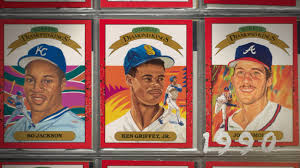Imagine a world where paintbrushes wield as much power as a bat hitting a home run or a fastball breaking a batter’s knees. This world is not fantasy—it’s the universe of Dick Perez, a legendary figure who paints portraits that don’t just capture the likenesses of baseball players but their very souls. Perez’s genius and vision are now the stars of a new documentary, aptly titled The Diamond King, which is currently streaming on several major platforms, including Apple TV, Prime Video, Google TV, and Kinema.
For anyone who holds an appreciation for baseball or the fine arts—or perhaps finds themselves ensconced between these worlds—The Diamond King is a cinematic debut sure to captivate hearts and minds alike. The film, a product of the creative powers at The McCaw and Votiv, uncovers the remarkable odyssey of Perez. It traces his footsteps from the sun-drenched streets of his birth in Puerto Rico, through the vibrant tapestry of Harlem, where he first unfurled the sails of his passions—baseball and art fused into one compelling narrative.
Bringing the story to life with the lyrical flourish of a seasoned raconteur, actor John Ortiz lends his voice to the documentary. Ortiz, famed for his roles in television series like Will Trent and Bad Monkey, guides viewers through intimate interviews with Perez, as well as enlightening chats with family members and fellow artistic souls. Within this tapestry of testimony lies the essence of a man whose artistry has become all but synonymous with the great game of baseball.
Dick Perez burst onto the scene in the 1980s, when he wielded his artistic prowess in collaboration with Donruss. Together, they created the celebrated Diamond Kings baseball card series, a collection that elevated the humble trading card to the status of bona fide fine art. Each card was a miniaturized portrayal, crafted with such precision and emotional resonance that sports fanatics and art connoisseurs alike couldn’t help but be drawn in. Over the ensuing years, Perez’s works found their place of honor on the walls of the Baseball Hall of Fame, nestled in private collections of the great and good, and featured in exhibitions worldwide.
What truly distinguishes Perez’s creations is his unique fusion of realism and emotional depth—a delicate balance that reveals not only the athlete but the quintessential human story behind the statistics. His baseball canvases are as much about legacy and history as they are about the sports figures themselves. Such is the impact of Perez’s work that one enthusiastic baseball writer, Steve Kopian from Unseen Films, remarked that the film, “is so good that I suspect that it will end up on endless repeat on the MLB channel for years to come.”
For those whose curiosity has been piqued, a tantalizing preview awaits via The Diamond King trailer. For those eager to dive deeper, the film’s website offers a portal not only to the documentary itself (available for rent or purchase) but to an expansive gallery of Perez’s prints, posters, cards, and more—a veritable treasure trove for collectors and admirers.
This cinematic tribute to Dick Perez is the latest venture from the imaginative minds at The McCaw, the creative outfit helmed by director Marq Evans. The team previously won accolades for their documentaries such as Claydream (2022), chronicling the whimsical yet profound legacy of Claymation pioneer Will Vinton—creator of the California Raisins and the timeless M&Ms characters. Before that, The Glamour & The Squalor (2016) took audiences on an auditory ride through the rise of grunge, spearheaded by Seattle radio DJ Marco Collins.
The Diamond King stands as an enthralling addition to their repertoire, further cementing their expertise in crafting documentaries that delve into the intersectionalities of art, history, and human experience. It’s a documentary that promises to resonate not just with lifelong baseball aficionados but also with those who cherish the convergence of art and sport—a reminder of the cultural threads that stitch together the tapestry of our shared human narrative. As the brushstrokes of Perez paint the players who defined eras, viewers are invited not just to watch history unfold, but to feel it in every vivid hue.

